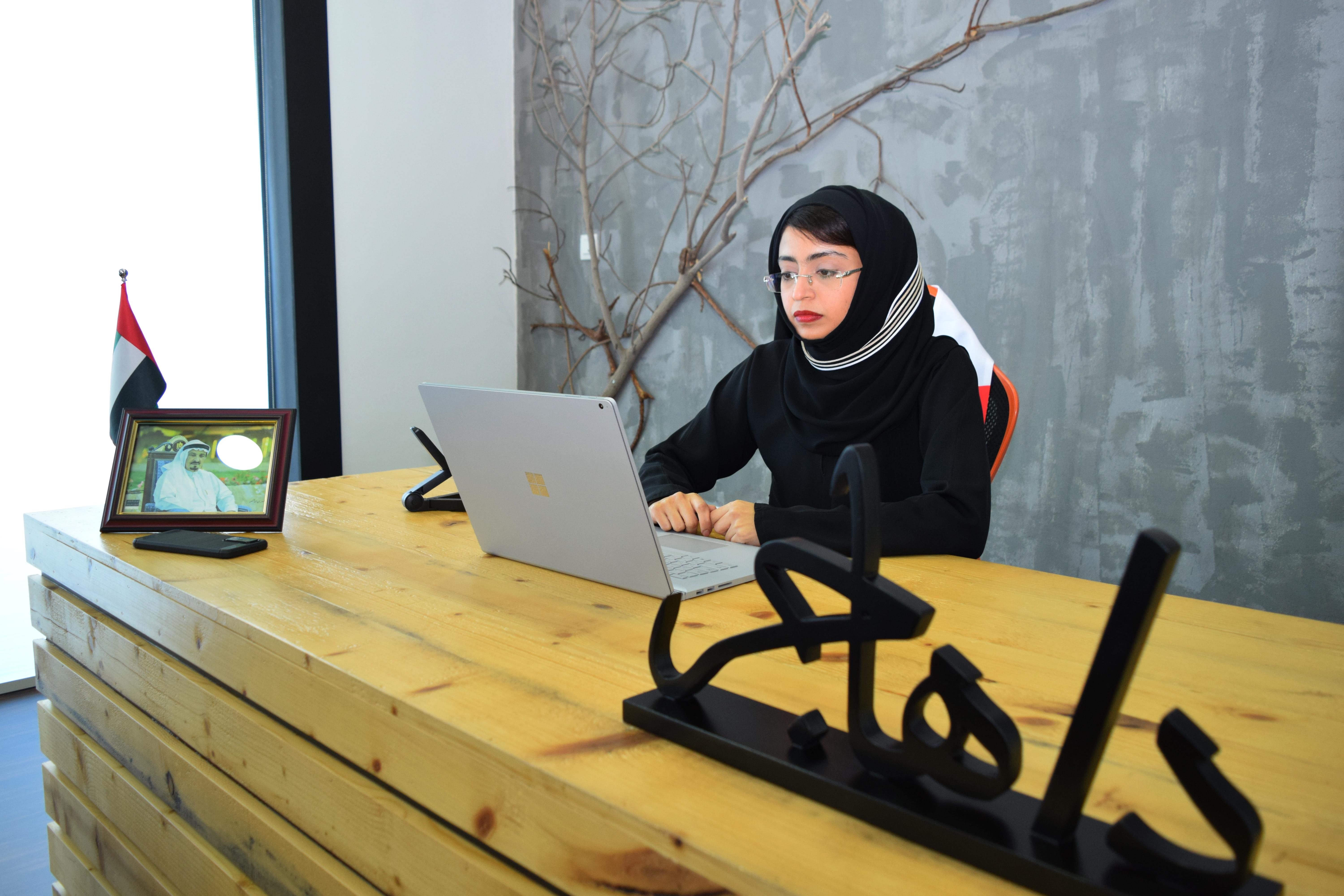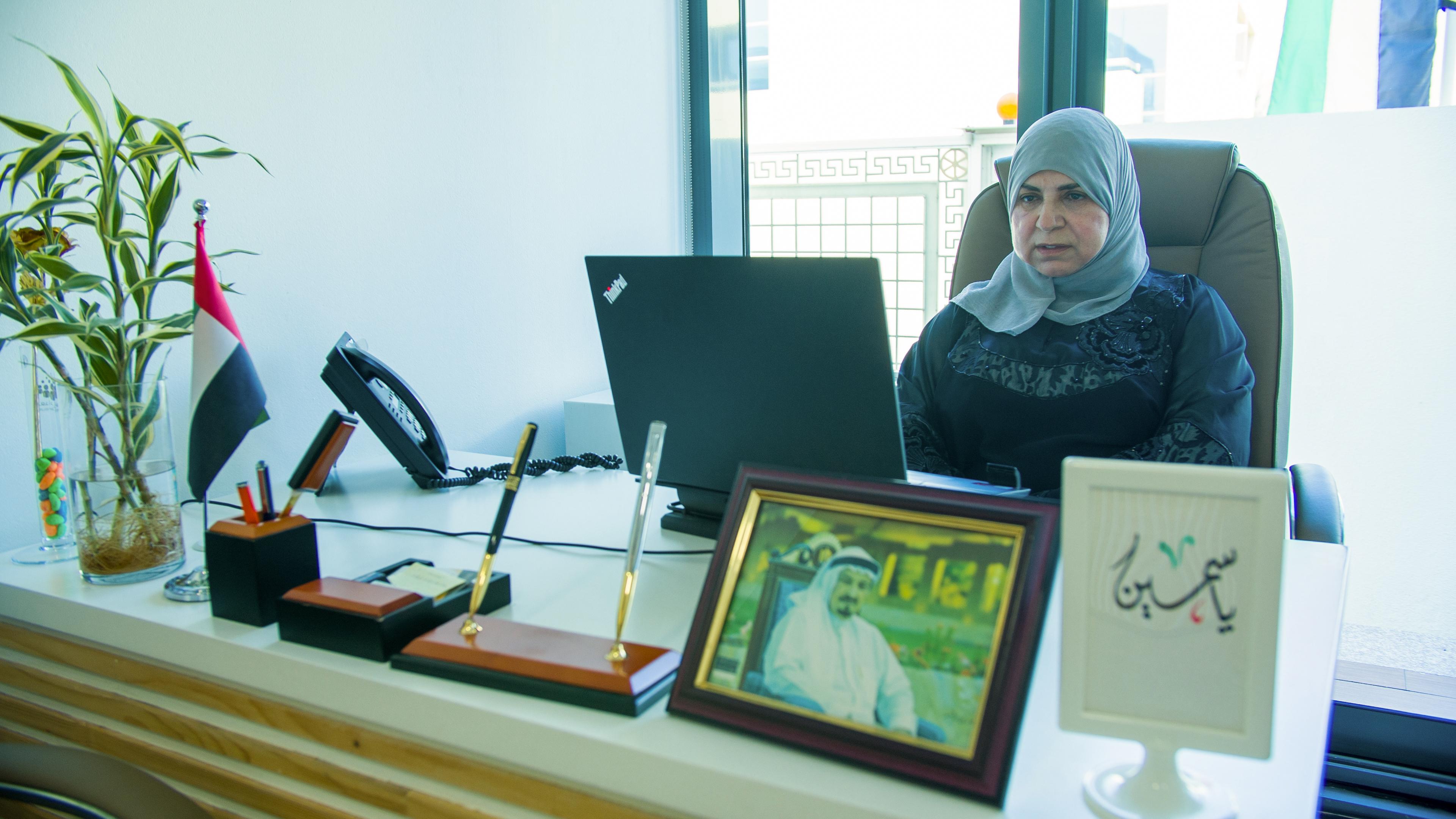Ajman Statistics and Competitiveness Center Participates in the meetings of the International Statistics Commission
|
General News
Ajman Statistics and Competitiveness Center participated in the activities of the 52nd session of the International Statistics Commission as a part of the delegation of the United Arab Emirates. This session was virtually held over four days (1st, 2nd, 3rd and 5th of this March) via Zoom online platform, in the presence of Dr. Hajar Al Hubaishi, the Executive Director of Ajman Statistics and Competitiveness Center and Dr. Yasmin Joudi, the statistical advisor of the Center.
This session was attended by the chairmen and directors of the statistical agencies from different countries worldwide, in addition to representatives of the statistical organizations and bodies at the international level, including the international organizations concerned with the statistical action, such as the World Bank, International Monetary Fund, International Labor Organization and UNESCO.
Following the launch of the session, the members of the Bureau were elected and the agenda was approved. During the first day, the participants reviewed the data and indices related to the Sustainable Development Plan of the year 2030, the inter-agency experts' report on the sustainable development indices and the Secretary General's report with regard to reviewing the progress achieved towards the realization of the sustainable development, as well as the report of the high level team on partnership, coordination and capacity building in statistics to monitor the Sustainable Development Plan of 2030, the report of the Committee for the senior Statisticians of the UN System on coordination within the UN statistical system, the report of the Committee for Statistical Activities Coordination and the report of the Friends of the Chair Group that is concerned with the economic statistics.
On the second day, the meeting discussed the report of the Inter-secretariats Working Group on National accounts, the report of the Committee of Experts on Business and Trade and the report of the Committee of Experts on Environmental-Economic accounting, as well as the Secretariat General's report on migration statistics, the report of Economic and Social Commission for Western Asia on regional cooperation for developing the official statistics and the report of the Secretariat General on the management and updating of the statistical systems.
The third day of the meetings addressed the report of the Global Working Group on Big Data for Official Statistics, the report of the Expert Group on International Statistical Classifications, the report of the Inter-secretariats Working Group on household surveys and the report of the Secretariat General on the presentation and publication of the data and metadata, as well as the report of the Secretariat General on the demographic statistics, the report of the UNESCO Institute of Statistics on the cultural statistics, the report of the Secretariat General on the climatic change statistics, the report of the Core Group of the Inter-Agency Expert Group on Disaster-related statistics, the report of the World Bank on the international comparison program, the report of the sponsors of data and metadata exchange initiative and the Secretary General's report on the development of the statistical capabilities, as well as the Secretary General's report on decisions of the General Assembly and the Economic and Social Council on the policies related to the activities of the Statistical Commission, the report of the Experts Group on the national quality assurance frameworks, the report of the Experts Group on the integration of statistical and geospatial information and the Secretary General's report on the World Statistics Day.
The participants concluded the fourth days of meetings with reviewing the report of the Statistical Commission on the activities of its 52nd session and the draft decisions.
Dr. Hajar Al Hubaishi, the Executive Director of Ajman Statistics and Competitiveness Center asserted that the activities of the 52nd of the meetings of the International Statistical Commission reviewed many of significant reports in statistics area, which contribute to the realization of the Sustainable Development Plan 2030.
In this regard, she pointed out that the annual meetings of the UN International Statistical Commission constitutes the most prominent global statistical event where statistics experts from around the world meet together. She , also, noted that sharing of the statistical experiences, expertise and innovations would have a significant impact on the development of the statistical action in the United Arab Emirates and broadening of the comprehensive view of the local experts.
Al Hubaishi added "The annual meetings of the UN Statistical Commission assume a major role for being one of the most prominent forums focusing on the development of the international statistical system, and due to their importance in making available the recent findings of the international statistical reports, as well as the successful experiences and practices of other countries. There is no doubt that the increased attention paid by the countries and governments in investment in data and statistics stresses their belief that statistics are the cornerstone for realizing the sustainable development."
It is worth mentioning that the International Statistics Commission, which was established in 1947, is the supreme international statistical reference that comprises the senior statistical experts from the member states around the world. It is also the highest body for making decisions on the international statistical activities. The UN Statistics Division organizes this meeting periodically on annual basis. This meeting constitutes the international statistics forum at the level of the statistical bodies worldwide.
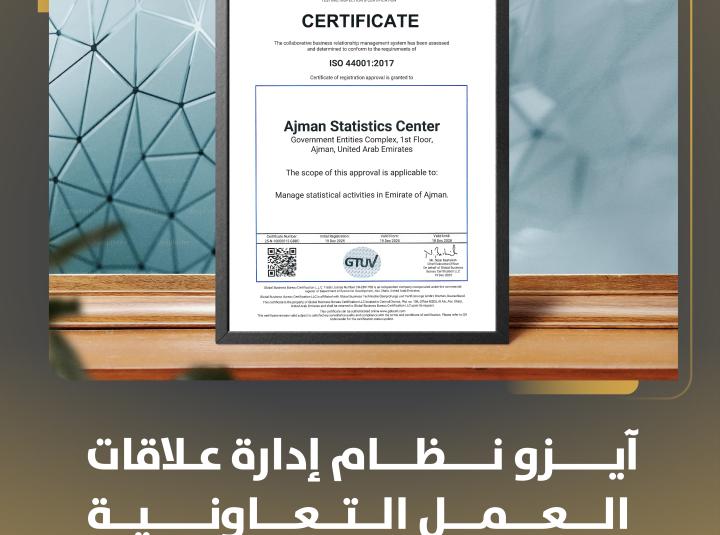
Ajman Statistics Center Receives ISO 44001:2017 Certification for Collaborative Business Relationship Management System
حصد مركز عجمان للإحصاء شهادة ISO 44001:2017 لنظام إدارة علاقات العمل التعاونية، في خطوة تعكس التزام المركز بتطبيق أفضل الممارسات الدولية لتعزيز جودة خدماته المؤسسية وتطوير علاقات الشراكة مع الجهات الحكومية والقطاع الخاص والمجتمع على المستويين المحلي والدولي. ويأتي هذا الإنجاز بعد اجتياز المركز أعمال التدقيق والتحقق من التزامه الكامل بتطبيق الإجراءات والعمليات المعتمدة، ودراسة الوثائق ومطابقتها لمتطلبات المواصفة وفق المعايير الدولية، بما يضمن فعالية وكفاءة إدارة الشراكات المؤسسية. وأكدت سعادة الدكتورة هاجر الحبيشي، المدير العام لمركز عجمان للإحصاء “أن الحصول على شهادة ISO 44001:2017 يجسد التزام المركز بتطبيق المعايير العالمية، ويعكس حرصه على تطوير منظومة العمل الإحصائي وفق أفضل الممارسات. مشيرةً إلى أن هذه الشهادة تسهم في تنظيم ورفع كفاءه إدارة الشراكات، ودعم متخذي القرار، وتعزيز التعاون مع جميع الشركاء بما يحقق أثرًا إيجابيًا ينعكس على مسيرة التنمية المستدامة في إمارة عجمان. وأضافت الدكتورة هاجر أن هذا الإنجاز يُمثل استكمالًا لمسيرة التميز المؤسسي للمركز، ويعكس جهوده المستمرة في بناء شراكات وعلاقات تعاونية متينة ومثمرة مع مختلف الجهات، وفتح آفاق التنسيق والتكامل لتعظيم أثر العمل المشترك، بما يخدم أهداف المركز ويُسهم في إسعاد المتعاملين. وتجسد هذه الشهادة خطوة مهمة في مسيرة التميز المؤسسي لمركز عجمان للإحصاء، مؤكدة التزامه المستمر بالابتكار، واستدامة الشراكات، ورفع كفاءة الأداء المؤسسي بما ينعكس إيجابيا على جودة الخدمات الحكومية ومكانة إمارة عجمان على الصعيد المؤسسي والاجتماعي والاقتصادي. وفي ذات السياق، أكد فريق مركز عجمان للإحصاء أن اعتماد هذه الشهادة يعزز القدرة على متابعة وتقييم أداء العلاقات التشاركية، ويتيح للمركز تحديد الاحتياجات التنظيمية بدقة، وتسريع عمليات التطوير لمنظومة العمل المشترك. وفي إطار جهود المركز المستمرة لتطوير منظومة الحوكمة المؤسسية وتعزيز جودة الأداء تم تجديد شهادة نظام المرونة المؤسسية 22316:2017ISO، بالإضافة إلى تجديد شهادة نظام إدارة المخاطر2018: ISO 31000، بما يسهم في تعزيز القدرة على التوقع والاستجابة والتكيف مع المتغيرات والأزمات، ورفع كفاءة العمليات التشغيلية.
Read more ➤➤➤
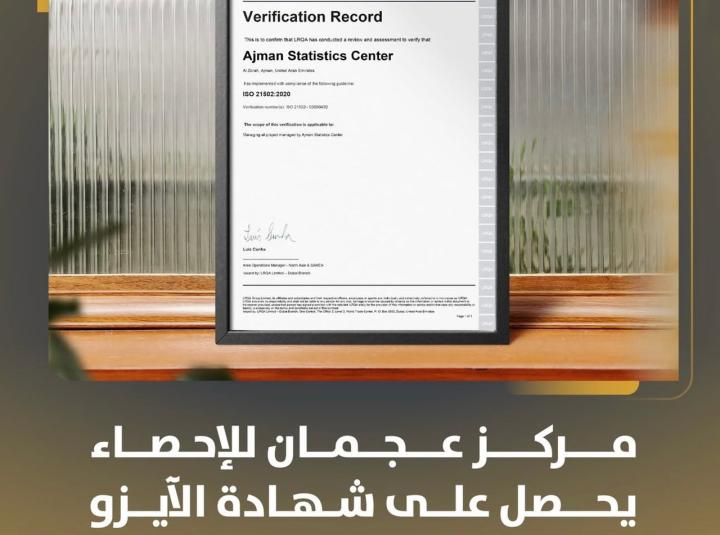
Ajman Statistics Center Obtains ISO 21502 Certification in Project Management
Ajman Statistics Center has obtained ISO 21502 certification for Project Management in the Strategy and Institutional Performance Department, as part of its ongoing efforts to adopt international best practices and enhance the efficiency and effectiveness of institutional project management. ISO 21502 is an international guidance standard that provides a comprehensive framework for project management across all phases, from planning through to closure, with a strong focus on achieving objectives and delivering added value with high efficiency. The standard encompasses a range of core principles and practices, including governance, stakeholder management, scope definition, time and cost management, quality, risk management, communication, and resource management. The Center’s attainment of this certification underscores its commitment to standardizing project management methodologies, improving the quality of decision-making, increasing project success rates, and ensuring alignment with strategic objectives. This, in turn, contributes to enhancing institutional performance and achieving sustainable institutional excellence.
Read more ➤➤➤
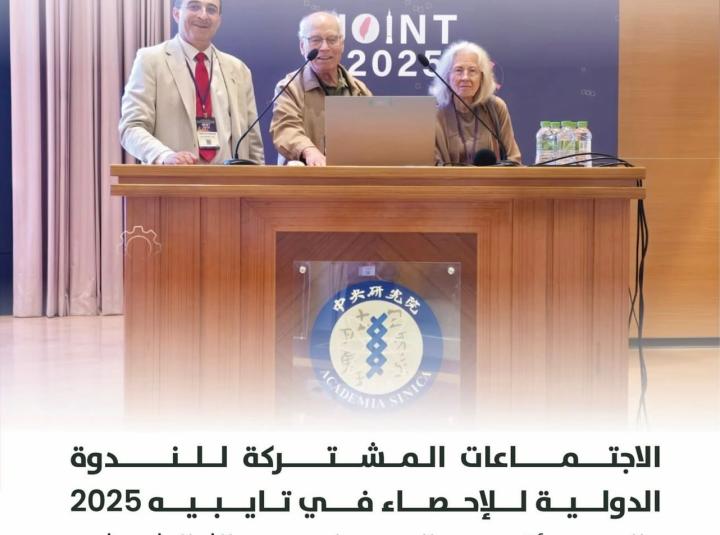
Joint Meetings of the International Statistical Seminar in Taipei 2025
Under the theme “New Horizons: Statistics in a Changing World,” the Taipei Joint 2025 Conference on Statistics and Data Science was organized in partnership between the Institute of Statistical Science, Academia Sinica (ISSAS), and the International Chinese Statistical Association (ICSA), in collaboration with the Chinese Institute of Probability and Statistics. The conference was held in the city of Taipei in December 2025, bringing together the 13th International Conference of the Chinese American Statistical Association and the International Statistical Seminar in Taipei. The conference was attended by a delegation from Ajman Statistics Center, reflecting the Center’s commitment to keeping abreast of the latest global practices and trends in statistics, quantitative analysis, and data science, as well as to strengthening channels of communication and knowledge exchange with international academic and statistical institutions. The conference served as an advanced scientific platform for discussion and partnership-building, with the participation of a distinguished group of academics, researchers, experts, and decision-makers from around the world, contributing to the advancement of statistical work and the enhancement of data quality in support of informed decision-making.
Read more ➤➤➤
